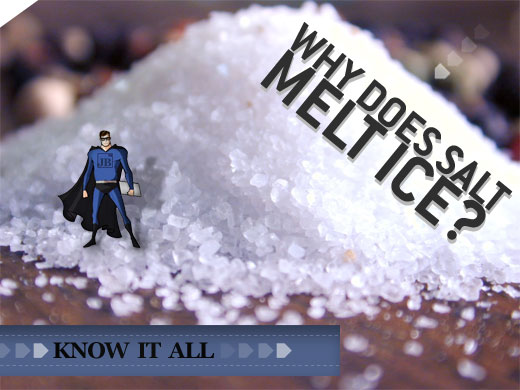Everybody has that moment when they realize they don’t know about something that they should probably know about. Whether it’s history, language, science, or cultural phenomena, you’ve felt the stinging personal embarrassment of a moment wherein you realize there’s some common knowledge that isn’t so common. Don’t feel bad; nobody knows everything. Nobody, that is, except me and my sidekick, The Internet!
Somewhere in the world, a confused soul begs the question…
Why and How Does Salt Melt Ice?
We’re all very comfortable with the notion that when snow falls or ice forms on a sidewalk, the best way to deal with it is to throw salt out there, to melt the ice. But why? How does combining these two relatively simple substances prevent one of them from assuming a different state of matter?
It’s actually pretty simple: when ice and water are interacting, there is a “rate of melting” and a “rate of freezing”. When the former is the higher of the two rates, ice will noticeably melt (above 32 degrees Fahrenheit, for example) and when the rate of freezing rises, the water will wholly freeze.
So, let’s add salt.
On a molecular level, the introduction of salt into a system of water-and-ice disrupts the melting/freezing equilibrium of that system. Salt replaces some of the water in the solution and because salt does not easily bond with ice, the rate of freezing in the system decreases, which means the rate of melting (even though it has not changed) becomes greater than the rate of freezing. Translation? Salt prevents water from freezing.
A fun secret: it’s not just salt. Dissolving any foreign substance (i.e., sugar or alcohol) in a solution of ice and water will yield similar results (though it's worth pointing out that the use of salt is so widespread because it is a cheaper, more readily-available, and more effective method to combat ice).










![No, Timeless Style Is Not a Made Up Marketing Term [Essay]](https://www.primermagazine.com/wp-content/uploads/2023/05/timeless-style_feature.jpg)





